
January 21
1855 Birth: Gun designer John Browning:
John Moses Browning, sometimes referred to as the "father of modern firearms," is born in Ogden, Utah. Many of the guns manufactured by companies whose names evoke the history of the American West-Winchester, Colt, Remington, and Savage-were actually based on John Browning's designs.
The son of a talented gunsmith, John Browning began experimenting with his own gun designs as a young man. When he was 24 years old, he received his first patent, for a rifle that Winchester manufactured as its Single Shot Model 1885. Impressed by the young man's inventiveness, Winchester asked Browning if he could design a lever-action-repeating shotgun. Browning could and did, but his efforts convinced him that a pump-action mechanism would work better, and he patented his first pump model shotgun in 1888.
Fundamentally, all of Browning's manually-operated repeating rifle and shotgun designs were aimed at improving one thing: the speed and reliability with which gun users could fire multiple rounds-whether shooting at game birds or other people. Lever and pump actions allowed the operator to fire a round, operate the lever or pump to quickly eject the spent shell, insert a new cartridge, and then fire again in seconds.
By the late 1880s, Browning had perfected the manual repeating weapon; to make guns that fired any faster, he would somehow have to eliminate the need for slow human beings to actually work the mechanisms. But what force could replace that of the operator moving a lever or pump? Browning discovered the answer during a local shooting competition when he noticed that reeds between a man firing and his target were violently blown aside by gases escaping from the gun muzzle. He decided to try using the force of that escaping gas to automatically work the repeating mechanism.
Browning began experimenting with his idea in 1889. Three years later, he received a patent for the first crude fully automatic weapon that captured the gases at the muzzle and used them to power a mechanism that automatically reloaded the next bullet. In subsequent years, Browning refined his automatic weapon design. When U.S. soldiers went to Europe during WWI, many of them carried Browning Automatic Rifles, as well as Browning's deadly machine guns.
During a career spanning more than five decades, Browning's guns went from being the classic weapons of the American West to deadly tools of world war carnage. Amazingly, since Browning's death in 1926, there have been no further fundamental changes in the modern firearm industry. (History.com)
1867 Birth: General Weygand:
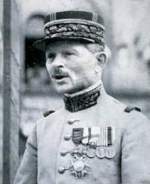
On this day, French Gen. Maxime Weygand is born in Belgium. He was one of the commanders who accepted the German surrender at the close of World War I only to advise the French government to surrender to the Germans early in World War II.
Although born in Belgium (his actual ancestry is uncertain), Weygand was educated in France and graduated from the Saint-Cyr training school for officers in 1888 with honors. He taught at a cavalry school where, in 1914, he won the respect of Gen. Ferdinand Foch, who made Weygand his chief of staff during the World War I.
Weygand held a variety of positions between the wars, including a post as adviser to the Polish army in 1920, and a stint as inspector general of the French army. He retired from active service in 1935, at age 68.
When the Germans invaded France in May 1940, Weygand was recalled into service to take command of the Allied troops in France-after the Germans were already overrunning much of the country. As the British Expeditionary Force was pushed to the Channel by the Germans and then finally pushed out of France, things looked increasingly desperate for the French.
Britain attempted to keep hope alive—Prime Minister Winston Churchill ordered more British troops into France and British bombers continued to attack German lines of communication. But despite the British reinforcements and encouragement, Weygand ordered the French military governor of Paris to ensure that the French capital remained an open city-in other words, there was to be no armed resistance to the Germans. Orders to this effect meant that Weygand was pushing for an armistice, a capitulation—the enemy would be allowed to pass through unchallenged. Weygand addressed his cabinet with his assessment of the situation: "A cessation of hostilities is compulsory." France capitulated.
Weygand served in the new German-loyal Vichy government as minister of defense, delegate general to French Africa, and governor-general of Algeria. He was dismissed in December 1941 and sent to Cannes to retire on a pension. He tried to get back into the fray in 1942 by flying to Algiers when the Allies invaded North Africa, but he was caught by the Germans and transported to Austria, where he sat imprisoned in an Austrian castle. Upon the surrender of Germany, he was released by U.S. troops of liberation but then rearrested on orders of Gen. Charles de Gaulle and charged with enemy collaboration. Weygand was "rehabilitated" within three years and pardoned for his concession to the Germans. De Gaulle was forced to admit that by the time Weygand took command of the army in France, "It was too late, without any doubt, to win the battle of France." (History.com)
1896 Birth: Paula Hitler: the last child of Alois Hitler and his third wife, Klara Poelzl. Quiet and unassuming, with a temperament similar to her mother's, Paula will remain Adolf's closest family link throughout his life. Adolf and Paula are the only offspring of both Klara and Alois to survive childhood, and neither will have children. She will die in obscurity in 1960. Paula Hitler:

I liked my brother [Adolf] best of all my brothers and sisters in spite of the difference in age . . . . Since I was so much younger than my brother he never considered me a playmate. He played a leading role among his early companions. His favorite game was cops and robbers, and that sort of thing. He had a lot of companions. I could not say what took place in their games, as I was never present. Adolf as a child always came home too late. He got a spanking every night for not coming home on time . . . .
When my brother became more and more active (in politics) and the name "Hitler" was known in Vienna, I had difficulties to such an extent, that I was at last dismissed from my position. At that time I changed my name to "Wolf". I went to Munich and described my difficult position of life to my brother. With full understanding he assured me that he would provide for me in the future. He did so until his death and at first transferred the sum of 250 Mk, [and] later on since 1938 the sum of 500 Mk to me. Moreover I got a present of 3000 Mk every Christmas . . . .
The personal fate of my brother affected me very much. He was still my brother, no matter what happened. His end brought unspeakable sorrow to me, as his sister. [For further details, Click here.]
1912 France: Raymond Poincare, who would pursue hardline anti-German policies, begins his first term as Prime Minister of France. [For further information, click here.]

1919 Wilson submits Buckler's report of his meeting with Litvinov to the Big Five in Paris. Buckler wrote that 'agreement with Russia can take place at once, obviating conquest and policing and reviving normal conditions as disinfectant against Bolshevism. (THP)
1924 Various:

Death: Vladimir Lenin:
Vladimir Lenin, the architect of the Bolshevik Revolution and the first leader of the Soviet Union, dies of a brain hemorrhage at the age of 54.
In the early 1890s, Lenin abandoned his law career to devote himself to Marxist study and the provocation of revolutionary activity among Russian workers. Arrested and exiled to Siberia in 1897, he later traveled to Western Europe, where in 1903 he established the Bolshevik faction of the Russian Social Democratic Workers' Party. The Bolsheviks were a militant party of professional revolutionaries who sought to overthrow the czarist government and set up a Marxist government in its place.
In 1905, workers rebelled across Russia, but it was not until 1917, and Russia's disastrous involvement in World War I, that Lenin realized that the opportunity for Communist revolution had come. In March 1917, the Russian army garrison at Petrograd defected to the Bolshevik cause, and Czar Nicholas II was forced to abdicate. Lenin immediately left Switzerland and crossed German enemy lines to arrive at Petrograd on April 16, 1917. Six months later, under his leadership, the Bolsheviks seized power in Russia, and Lenin became virtual dictator of the country. However, civil war and foreign intervention delayed complete Bolshevik control of Russia until 1920.
Lenin's government nationalized industry and distributed land, and on December 30, 1922, the Union of Soviet Socialist Republics (USSR) was established. Upon Lenin's death in early 1924, his body was embalmed and placed in a mausoleum near the Moscow Kremlin. Petrograd was renamed Leningrad in his honor. Fellow revolutionary Joseph Stalin succeeded him as leader of the Soviet Union. (History.com)
USSR: A triumvirate of Stalin, Grigory Zinoviev, and Lev Kamenev is formed after Lenin's death, to exclude Trotsky from power. Stalin begins a plan to gradually ease Zinoviev and Kamenev, both of Jewish descent, out of power and gain complete control of the Soviet Union (USSR) for himself.
1929 Weimar: An essay by Goebbels is published in Der Angriff:
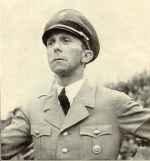
Everything is discussed openly in Germany, and every German claims the right to have an opinion on any and all questions. One is Catholic, the other Protestant, one an employee, the other an employer, a capitalist, a socialist, a democrat, an aristocrat. There is nothing dishonorable about choosing one side or the other of a question. Discussions happen in public, and where matters are unclear or confused one settles it by argument and counter argument. But there is one problem that is not discussed publicly, one that it is delicate even to mention: the Jewish question. It is taboo in our republic.
1930 Jan 21-April 1: The London Naval Conference extends the Washington agreement to cruisers and destroyers, and regulates submarine warfare. Britain, Japan, and the United States also accept a treaty limiting the size of battleships. Note: The Japanese will abrogate these treaties in 1934.
1934 Austria: The government approves establishment of a Jewish self-defense force in Vienna. [See: Austria: The Other Germany.]
1938 Holocaust: Romania formally abrogates the minority rights of Jews, and revokes the citizenship of many Jews who have been resident there since the end of the war.
1939: Various:
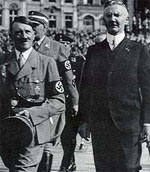
Hitler dismisses Hjalmar Schacht as president of the Reichsbank and replaces him with Walter Funk. Schacht was left as an unpaid minister without portfolio until 1943. Note: A secret report to Hitler, prepared by Himmler, had accused Schacht of being disloyal to Nazi interests in his negotiations with George Rublee. (THP)
Holocaust: Hitler tells Czech foreign minister Chvalkovsy, "We are going to destroy the Jews—they are not going to get away with what they did on November 9, 1918. The day of reckoning has come." (THP)
World War II: Joseph Goebbels attacks America (verbally):
The American press seems to have the right to complain about Europe. It makes vigorous use of this right, particularly when Germany is involved. National Socialist Germany is a thorn in its eye. The Third Reich has been the target of its mockery, hatred, lies, and slander since 30 January 1933, especially from that part controlled by the Jews. The American press takes particular pleasure in criticizing Germany on grounds of humanitarianism, civilization, human rights, and culture. It has every right to do so. Its humanity is shown by lynchings. Its civilization is shown in economic and political scandals that stink to high heaven. Its human rights are displayed by eleven or twelve million unemployed, who apparently chose to be so. And its culture exists only because it is always borrowing from the older European nations. Such a nation is certainly justified in sneering at ancient Europe, whose nations and peoples looked back on centuries, even millennia of cultural achievements long before America was discovered.
1941 World War II: Various:
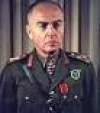
Romania: Antonescu stages a coup against his own government. A number of Legionaries are killed, but they continue to hold out in some places.
The United States lifts the ban on arms to the Soviet Union.
1942 World War II: Various:
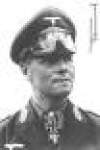
North Africa: German forces under Erwin Rommel launch a counter-offensive in North Africa. Caught by surprise, the British are forced into a retreat across the desert. [See: The Mediterranean Strategy.]
War with Japan: Secret Army intelligence report states there is an 'espionage net containing Japanese aliens, first and second generation Japanese and other nationals thoroughly organized and working underground.' General DeWitt, in a telephone call, tells General Mark Clark that he expects 'a violent outburst of coordinated and controlled sabotage' among the Japanese population.
Holocaust: Hungarian Fascists at Sovi Sad in occupied Yugoslavia drive 550 Jews and 292 Serbs to the river and onto the ice. After firing on the ice to break it up, they shoot all those who manage to stay afloat. A total of 2,550 Serbs and 700 Jews are killed by the Hungarians at Novi Sad. (THP)
1945 World War II: Various:
Hungary: Hitler orders that all commanding generals down to divisional level must inform him in advance of any operational movements by the units under their command. "They must ensure that I have time to intervene in their direction if I think fit, and that my counter-orders can reach the front-line troops in time." (Read) [See: Why Did Hitler Insist on No Surrender?]
East Prussia: Gumbinnen is taken by the Soviets. [See: The Last Days of the Third Reich.]
Goebbels publishes his last major anti-Semitic essay:

One could not understand this war if one did not always keep in mind the fact that International Jewry stands behind all the unnatural forces that our united enemies use to attempt to deceive the world and keep humanity in the dark. It is so to speak the mortar that holds the enemy coalition firmly together, despite its differences of class, ideology and interests. Capitalism and Bolshevism have the same Jewish roots, two branches of the same tree that in the end bear the same fruit. International Jewry uses both in its own way to suppress the nations and keep them in its service. How deep its influence on public opinion is in all the enemy countries and many neutral nations is plain to see that it may never be named in newspapers, speeches and radio broadcasts. There is a law in the Soviet Union that punishes anti-Semitism—or in plain English, public education about the Jewish Question—by death. The expert in these matters is in no way surprised that a leading spokesman for the Kremlin said over the New Year that the Soviet Union would not rest until this law was valid throughout the world. In other words, the enemy clearly says that its goal in this war is to put the total domination of Jewry over the nations of the earth under legal protection, and to threaten even a discussion of this shameful attempt.
1946 Nuremberg Tribunal: Day 39:
Continuation of M. Charles's Gerthoffer's Presentation of case regarding actions in Western Europe (the Netherlands).
Beginning of M. Delpech's Presentation of case regarding actions in Belgium. M. Charles's Gerthoffer
Before finishing this rapid summary of juridical questions, the Tribunal will permit me to refute in advance an argument which will certainly be presented by the Defense, especially as far as economic plunder is concerned. They will claim that your high jurisdiction did not exist, that international penal law had not yet been formulated in any text when the defendants perpetrated the acts with which they are at present charged, and that therefore they could not be condemned to any sentence whatsoever by virtue of the principle of non-retroactivity of penal laws.
Why, Gentlemen, is this principle adopted by modem legislation? It is indisputable that any person who is conscious of never having violated any legal prescription could not be condemned because of acts which were committed in such circumstances.
For example, somebody issues a check without funds to cover it, before his country had adopted a penalty for such an offense. But the case which is submitted to you is quite different. The defendants cannot maintain that they were not conscious of having violated legislation of any kind. First of all, they violated international conventions: The Hague Convention of 1907, the Kellogg- Briand Pact of 27 August 1938, and then they violated all the penal laws of the invaded countries.
How, in these proceedings, shall economic plunder be qualified? Theft, swindling, blackmail, and even, I will add, murder-since, in order to attain their aims, the Germans have premeditated and committed numerous murders which enabled them to intimidate the population in order to plunder them better. [For the full text of today's proceedings, Click here.]
1950 Cold War: Alger Hiss convicted of perjury:

In the conclusion to one of the most spectacular trials in U.S. history, former State Department official Alger Hiss is convicted of perjury. He was convicted of having perjured himself in regards to testimony about his alleged involvement in a Soviet spy ring before and during World War II. Hiss served nearly four years in jail, but steadfastly protested his innocence during and after his incarceration.
The case against Hiss began in 1948, when Whittaker Chambers, an admitted ex-communist and an editor with Time magazine, testified before the House Un-American Activities Committee and charged that Hiss was a communist in the 1930s and 1940s. Chambers also declared that Hiss, during his work in the Department of State during the 1930s, had passed him top secret reports.
Hiss appeared before HUAC and vehemently denied the charges, stating that he did not even know Chambers. Later, after confronting Chambers face to face, Hiss admitted that he knew him, but that Chambers had been using another name at the time. In short order, Chambers produced the famous "Pumpkin Papers"—copies of the documents he said Hiss passed him during the 1930s. They were dubbed the "Pumpkin Papers" because Chambers kept them hidden in a pumpkin in his pumpkin patch.
Charges and countercharges about the spy accusations soon filled the air. Defenders of Hiss, such as Secretary of State Dean Acheson, declared that President Truman's opponents were making a sacrificial lamb out of Hiss. Truman himself declared that HUAC was using "red herrings" to defame Hiss. Critics fired back that Truman and Acheson were "coddling" communists, and that Hiss was only the tip of the iceberg—they claimed that communists had penetrated the highest levels of the American government.
Eventually, Hiss was brought to trial. Because the statute of limitations had run out, he was not tried for treason. Instead, he was charged with two counts of perjury—for lying about passing government documents to Chambers and for denying that he had seen Chambers since 1937. In 1949, the first trial for perjury ended in a deadlocked jury. The second trial ended in January 1950 with a guilty verdict on both counts.
The battle over the Hiss case continued long after the guilty verdict was handed down. Though many believed that Hiss was a much-maligned official who became a victim of the anticommunist hysteria of the late-1940s, others felt strongly that he was a lying communist agent. Until his death at the age of 92 on November 15, 1996, Hiss never deviated from his claim of innocence.(History.com)
1954 USA: The first atomic submarine, the USS Nautilus, is launched at Groton, Conn. (AP)
1961 Werner von Braun:
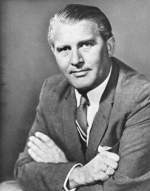
Hitler's former chief rocket scientist now working for the US Space Program, is awarded his only documented patent, for a "Rocket Propelled Missile." While he claimed that he had received ten patents during his years of work in Germany, no proof of any had ever been found. (Piszkiewicz) [See: Wunderwaffen: Hitler's Deception and the History of Rocketry.]
1977 President Carter pardons draft dodgers: On this day in 1977, U.S. President Jimmy Carter grants an unconditional pardon to hundreds of thousands of men who evaded the draft during the Vietnam War. [For further information, click here]
1990 East Germany: The Communist party expels former leader Egon Krenz and 13 other politburo members.
1997 German Chancellor Helmut Kohl and Czech Prime Minister Vaclav Klaus sign a declaration cementing postwar reconciliation between Germany and the Czech Republic.
Edited by Levi Bookin (Copy editor)
levi.bookin@gmail.com



Click to join 3rdReichStudies

Disclaimer: This site includes diverse and controversial materials--such as excerpts from the writings of racists and anti-Semites--so that its readers can learn the nature and extent of hate and anti-Semitic discourse. It is our sincere belief that only the informed citizen can prevail over the ignorance of Racialist "thought." Far from approving these writings, this site condemns racism in all of its forms and manifestations.
Fair Use Notice: This site may contain copyrighted material the use of which has not always been specifically authorized by the copyright owner. We are making such material available in our efforts to advance understanding of historical, political, human rights, economic, democracy, scientific, environmental, and social justice issues, etc. We believe this constitutes a "fair use" of any such copyrighted material as provided for in section 107 of the US Copyright Law. In accordance with Title 17 U.S.C. Section 107, the material on this site is distributed without profit to those who have expressed a prior interest in receiving the included information for research and educational purposes. If you wish to use copyrighted material from this site for purposes of your own that go beyond 'fair use', you must obtain permission from the copyright owner.
Please Note: The list-owner and the moderator of 3rdReichStudies are not responsible for, and do not necessarily approve of, the random ads placed on our pages by our web server. They are the unfortunate price one pays for a 'free' website.